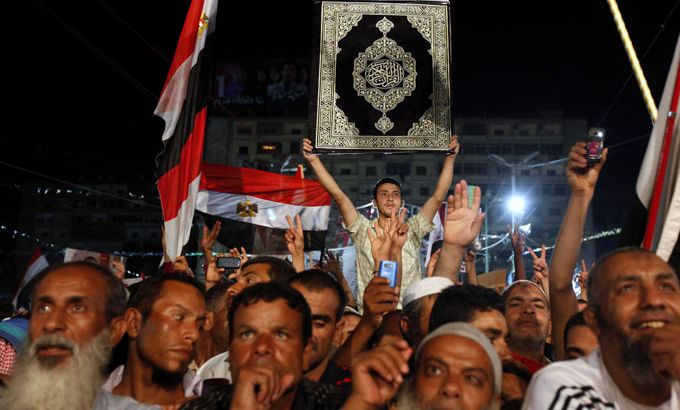Egypt says no concessions to Morsi supporters
Interim president declares end of foreign-led efforts to resolve political crisis and warns patience is wearing thin.

Egypt’s interim president, Adly Mansour, has blamed the Muslim Brotherhood for the “failure” of international talks aimed at resolving Egypt’s political crisis, and warned supporters of deposed president Mohamed Morsi that the government will not make any concessions to them.
“The train of the future has left the station,” he said in a televised address on Wednesday night, marking the end of Ramadan and the beginning of the Eid al-Fitr holiday. “It’s moving forward, and all of us have to catch it.”
Al Jazeera’s Rory Challands, reporting from Nasr City where pro-Morsi protests continue, said Mansour’s speech would not change what the protesters are doing.
He said there were worries about the possible next move of the government but that Morsi supporters were willing to resist military rule and “sacrifice”.
“The most likely scenario is that the government makes some sort of besiegement around the sit-in areas,” he said. “They might block the entrances, cut the water and food supplies. Nobody would expect a blood bath in here.” our correspondent said.
Earlier, the presidency announced the end of foreign-led efforts to resolve the turmoil, which has been spiralling since the army toppled Morsi on July 3.
In a statement carried on state news agency MENA, it said: “The Egyptian state … holds the Muslim Brotherhood fully responsible for the failure of those efforts [by foreign envoys] and what may be the consequences of this failure.”
Prime Minister Hazem el-Beblawy warned, meanwhile, that the government’s decision to clear the ongoing pro-Morsi protests is “final,” and urged demonstrators to leave, saying they had “broken all the limits of peacefulness”.
“The government’s patience to bear this is nearly expired,” he said, adding that any use of weapons against policemen or citizens would “be confronted with utmost force and decisiveness.”
‘Need to be worried’
All of this follows a call by Qatar’s foreign minister, Khaled al-Attiya, to release members of the Muslim Brotherhood from jail, and come amid visits to Cairo by US senators John McCain and Lindsey Graham.
Foreign envoys from America, Europe, Africa and several Gulf Arab states have been visiting Egypt in the past month, with little success.
In a joint statement issued on Wednesday, US secretary of state John Kerry and EU foreign policy chief Catherine Ashton said they “remain ready to help in any way that we can.”
“The Egyptian government bears a special responsibility to begin this process to ensure the safety and welfare of its citizens,” the two added.
“What I see is that confrontation is mounting and that more people will turn to the streets to protest and the tendency in the armed forces to repress that will mount,” said Dutch foreign minister Frans Timmermans, the latest foreign official to visit Cairo.
“So I think there’s need to be worried about the next days and weeks,” he said.
Thousands of pro-Morsi protesters have camped out in Cairo, demanding the reinstatement of the leader, and rejecting proposals by the interim leadership.
They say that several of their political leaders have been detained illegally, including Morsi himself.
Almost 300 people have been killed in political violence since the overthrow, including 80 Morsi supporters shot dead by security forces in a single incident on July 27.
The EU’s foreign affairs head Catherine Ashton and an African Union delegate, former Malian president Alpha Oumar Konare, both managed to secure meetings with Morsi and reported he was in good health.
On August 1, the interim leadership first warned those protesting that it had authorised police to break up rallies in “gradual steps.”